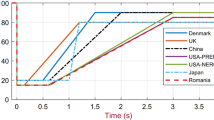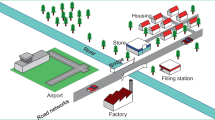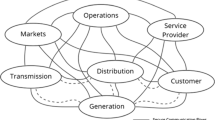Abstract
In microgrids, the integration of distributed energy resources (DERs) in the residential sector can improve power reliability, and potentially reduce power demands and carbon emissions. Improving the utilization of renewable energy in households is a critical challenge for DERs. In this regard, renewable power sharing is one of the possible solutions to tackle this problem. Even though this solution has attracted significant attention recently, most of the proposed power sharing frameworks focus more on centralized schemes. In contrast, in this paper, the performance of a proposed distributed power sharing framework is investigated. The problem is formulated as a repeated game between households in a microgrid. In this game, each household decides to cooperate and borrow/lend some amount of renewable power from/to a neighboring household, or to defect and purchase the entire demands from the main grid based on a payoff function. The Nash equilibrium of this game is characterized and the effect of the strategies taken by the households on the system is analyzed. We conduct an extensive evaluation using real demand data from 12 households of different sizes and power consumption profiles in Stockholm. Numerical results indicate that cooperation is beneficial from both an economical and environmental perspective and that households can achieve cost savings up to 20 %.






Similar content being viewed by others
References
The International Energy Agency (IEA) (2014) World energy outlook. http://www.iea.org/. Accessed Dec 2014
Ipakchi A, Albuyeh F (2009) Grid of the future. Power Energy Mag IEEE 7(2):52–62
Energy Information Administration, US (2014) http://www.eia.gov/todayinenergy/. Accessed Dec 2014
Farhangi H (2010) The path of the smart grid. Power Energy Mag IEEE 8(1):18–28
Amin SM, Wollenberg BF (2005) Toward a smart grid: power delivery for the 21st century. Power Energy Mag IEEE 3(5):34–41
Gellings CW, Chamberlin JH (1987) Demand-side management: concepts and methods
Hatziargyriou N, Asano H, Iravani R, Marnay C (2007) Microgrids. Power Energy Mag IEEE 5(4):78–94
Barnes J et al (2013) Freeing the grid 2013 best practices in state net metering policies and interconnection procedures. In: Latham NY (ed) Interstate Renewable Energy Council (IREC). http://freeingthegrid.org/wp-content/uploads/2013/11/FTG_2013.pdf. Accessed May 2015
Zhu T, Mishra A, Irwin D, Sharma N, Shenoy P, Towsley D (2011) The case for efficient renewable energy management in smart homes. In: Proceedings of the third ACM workshop on embedded sensing systems for energy-efficiency in buildings, ACM, pp 67–72
Tesla Powerwall (2015) http://www.teslamotors.com/powerwall. Accessed May 2015
Xie X (2012) Vanadium redox-flow battery. Tennessee Valley Authority
Alskaif T, Zapata MG, Bellalta B (2015) A reputation-based centralized energy allocation mechanism for microgrids. In: Smart Grid Communications (SmartGridComm), 2015 6th IEEE international conference
Yao J, Venkitasubramaniam P (2015) Optimal end user energy storage sharing in demand response. In: Smart Grid Communications (SmartGridComm), 2015 6th IEEE international conference
Zhu T, Huang Z, Sharma A, Su J, Irwin D, Mishra A, Menasche D, Shenoy P (2013) Sharing renewable energy in smart microgrids. In: Proceedings of the ACM/IEEE 4th international conference on cyber-physical systems, ACM, pp 219–228
Liu T, Tan X, Sun B, Wu Y, Guan X, Tsang DH (2015) Energy management of cooperative microgrids with p2p energy sharing in distribution networks. In: Smart Grid Communications (SmartGridComm), 2015 6th IEEE international conference
Alskaif T, Zapata MG, Bellalta B (2015) Game theory for energy efficiency in wireless sensor networks: latest trends. J Netw Comput Appl 54:33–61
Alskaif T, Zapata MG, Bellalta B (2015) Citizens collaboration to minimize power costs in smart grids: a game theoretic approach. In: SMARTGREENS–4th international conference on smart cities and green ict systems, Lisbon, Portugal, SCITEPRESS–Science and Technology Publications, pp 300–305
Fudenberg D, Maskin E (1986) The folk theorem in repeated games with discounting or with incomplete information. Econometrica 54(3):533–554
Friedman JW (1971) A non-cooperative equilibrium for supergames. Rev Econ Stud 38(1):1–12
Axelrod R, Hamilton WD (1981) The evolution of cooperation. Science 211(4489):1390–1396
Gale D, Shapley LS (1962) College admissions and the stability of marriage. American mathematical monthly, pp 9–15
Nord Pool (2013). http://www.nordpoolspot.com. Accessed May 2015
Brander M, Sood A, Wylie C, Haughton A, Lovell J (2011) Electricity-specific emission factors for grid electricity. Technical paper
Acknowledgments
This work was partially supported by projects TIN2013-47272-C2-2, TEC2012- 32354 and SGR-2014-881.
Author information
Authors and Affiliations
Corresponding author
Rights and permissions
About this article
Cite this article
AlSkaif, T., Zapata, M.G., Bellalta, B. et al. A distributed power sharing framework among households in microgrids: a repeated game approach. Computing 99, 23–37 (2017). https://doi.org/10.1007/s00607-016-0504-y
Received:
Accepted:
Published:
Issue Date:
DOI: https://doi.org/10.1007/s00607-016-0504-y
Keywords
- Microgrids
- Game theory
- Demand side management
- Distributed energy resources
- Electricity cost minimization problem
- Carbon emission reduction strategies




